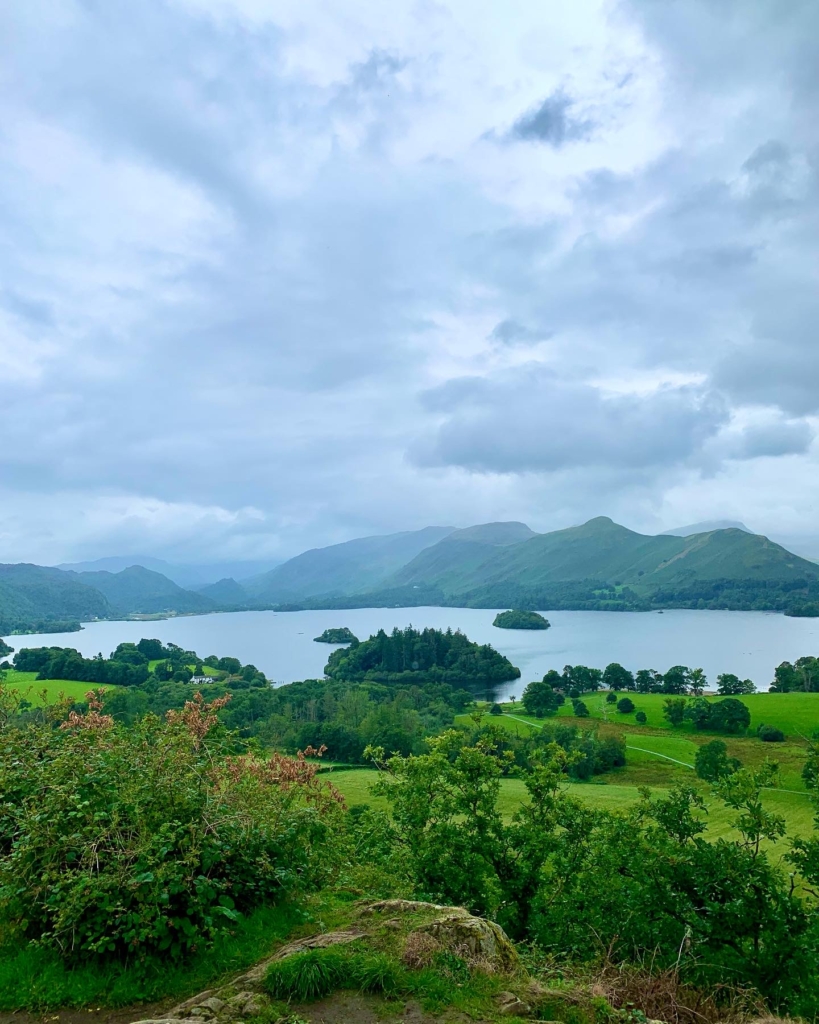I have returned to Keswick in the Lake District on my second trip here. And like the first time, I know before I leave that I will return.
There is something quite distinct about this pocket of England, so different from the London metropolis in the south and the large historic cities that dot the country. The abundant and lush greenery of the forests and fields punctuated with the area’s namesake, the Lakes, are protected by the varying heights and contours of the fells – some smooth and gentle, others rugged and sharp.
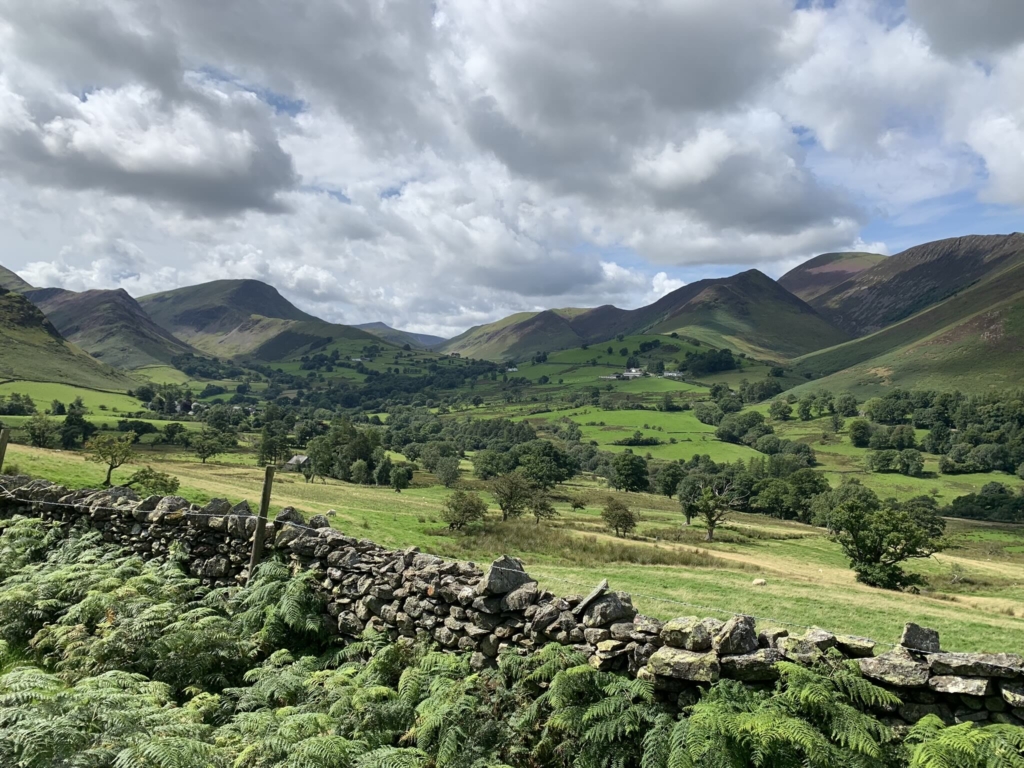
The hiking is divine. Whether an amateur or professional, there are trails to accommodate any skillset and fitness level: as long as you get out there to tackle a 30-minute walk or a 5-hour hike, you will glean what makes this area astonishingly beautiful.
This striking scenery, and the peace and contemplation it helps stir, explains how the Romantic movement in England found fertile soil and refuge here. As industrialization drove urbanization along with manufacturing automation and factories, many of the old traditional family businesses and ways of life disappeared. A connection to the land was lost and society became alienated from nature. In tandem, the Age of Reason with its emphasis on rationality and order was slowly unravelling belief in the supernatural, superstitions, and even Christianity. All of this led to a profound cultural dislocation. The certainties and traditions that people had previously inherited were vanishing.
Romanticism became the upstart rebel’s response to these social and cultural changes. It was the flag-bearer of resistance against the Science of Order.
Romanticism sought to restore the individual from the dehumanizing effects of the Industrial Revolution. Led in England by the great Lake poets of William Wordsworth, Samuel Taylor Coleridge, and Robert Southey, Romanticism validated subjectivity, emotion and personal experience as a means of authentic truth. It advocated a return to traditional modes of living and nature. It praised mystery, magic, and wonder, and it celebrated the irrational and creative mind.
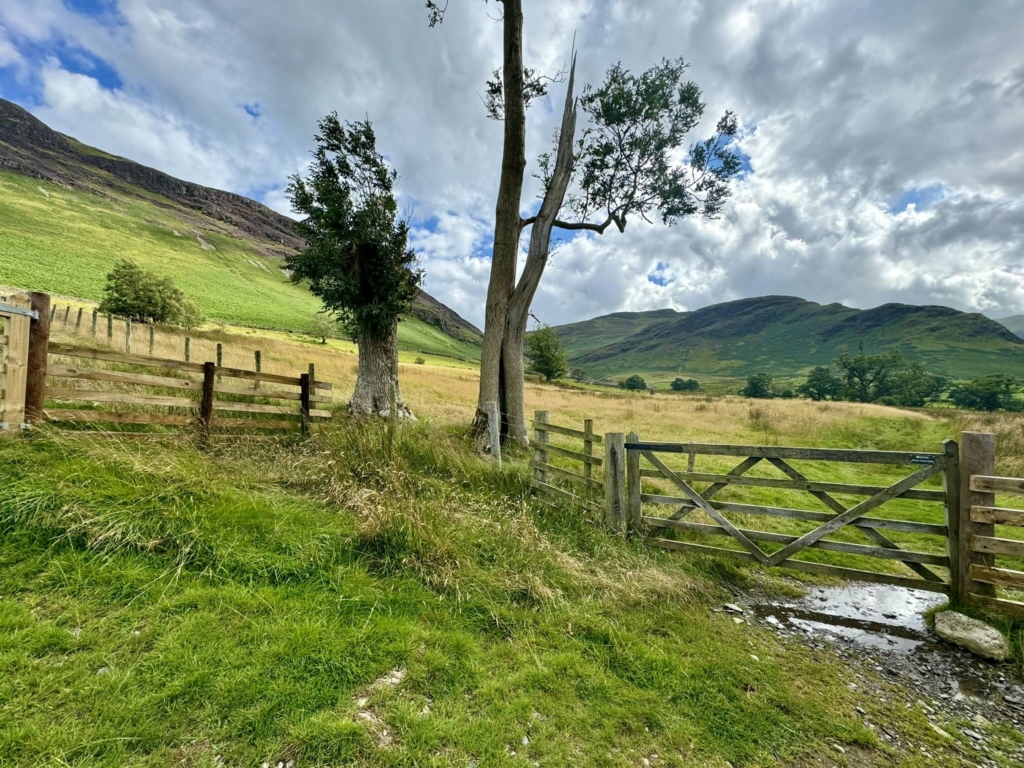
I can see a similar trend between the Romantic movement and its revolt against Industrialization and our own time. The last few decades in the West have had several cultural, social, and economic changes that have seemingly unmoored us. From a distrust in government and religious institutions, to a skepticism of broad systems like Capitalism and even Western medicine, there appears to be a strong questioning of organizations and models that previously were seen as providing security, progress and stability. Certainly, advancements in technology and the rise of social media have eroded trust in traditional news and single narratives of truth. On that point, truth itself seems to be ever in doubt as moral relativism and subjectivity emphasize personal experience over universality. We hear this in our language with the invocation of “my truth” statements. This has all contributed to a discontent and feeling that the old way of doing things is failing. And we yearn for some new order that will help us reimagine our place in the world. “Something is broken” or “we are broken” or “we’ve got it wrong” is a common refrain from so many people I know.
My intention is neither to affirm nor dismiss this disillusionment, but to playfully remark, as the Barenaked Ladies once did – “it’s all been done.” Our current cultural dislocation, our feeling that all is not right, is not new. So many before us have felt exactly the same way. Should we feel comfort in this recurring motif? I’m not sure.
And another repeating theme is the amount solutions proposed to our angst that frequently harken back to some imagined mythical history: in this view, we were somehow more aligned with each other, with nature, and with the world. Remember when we lived off the land and we were happy? Or when neighbours helped each other and pooled their resources and looked after one another’s children? Or when children respected their parents and parents respected each other? Or when this or that society revered nature and planned their lives around the cycle of animals and moons and harvests and lived in peace? Or when there was no such thing as money and greed? Or when we were actually spiritual and knew God(s)? The further back in time one goes, it seems the more idealized these snapshots of history become. But in the celebration of the positive attributes of these histories (both real and imagined), we overlook all the challenges too. I can assure you, there were discontents in every time in history – people that were not happy, that felt change and progress were in order.
Many of the Romantics felt that an ideal state of beauty, authenticity and synergy with the world was in the Medieval period, where our bond with nature was strong and the code of chivalry seemed to provide some principles by which to govern our lives by. It sounds beautiful, but only as a statement of platitude. However fascinating Medieval Europe might be – which it is – even a casual analysis of that time period exposes problems that would challenge it as an ideal state. Being a serf meant you certainly knew your place in the world and weren’t confused with what to be when you grew up, but it was a tough gig trying to eek a living in those times.
I wonder how much of our own idealized solutions to today’s problems are practical, or hover in that cloudy ethereal state of beauty only because we don’t tease out how to systematically implement them or unpack the consequences of doing so. Or worse, if we did figure out how to realize these solutions, would we create new systems and institutions that some people (people like us?) would ultimately become discontent with and call for change – for progress?
* * *
A wonderful day trip from wherever you are in the Lakes is to the town of Grasmere. A lovely town situated between Windermere and Keswick, it not only offers great hikes, but a more personal peek into the Romantic poet William Wordsworth (1770-1850) and his life in the Lake District. Though Wordsworth’s poetic currency might have diminished over time (when I mention him to almost any of my younger colleagues at work in Toronto, they have never heard of him), he still stands on a pedestal amongst connoisseurs of Romantic poetry. Dove Cottage and Wordsworth Museum in Grasmere, where Wordsworth composed some of his works, is dedicated to providing visitors a glimpse into his thoughts, beliefs, and living environment. I began to have a greater appreciation for Wordsworth’s poetry after visiting the museum. I was really only familiar with what we might call his Greatest Hits from my school days, and the museum gave some great and nuanced context to the man.
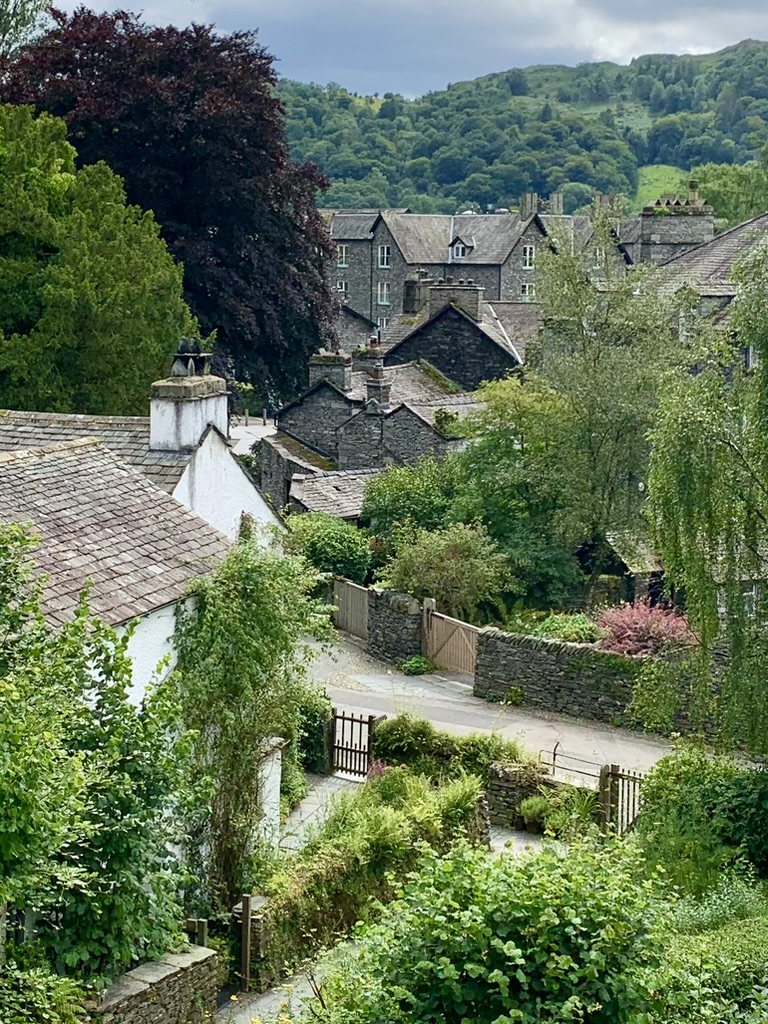
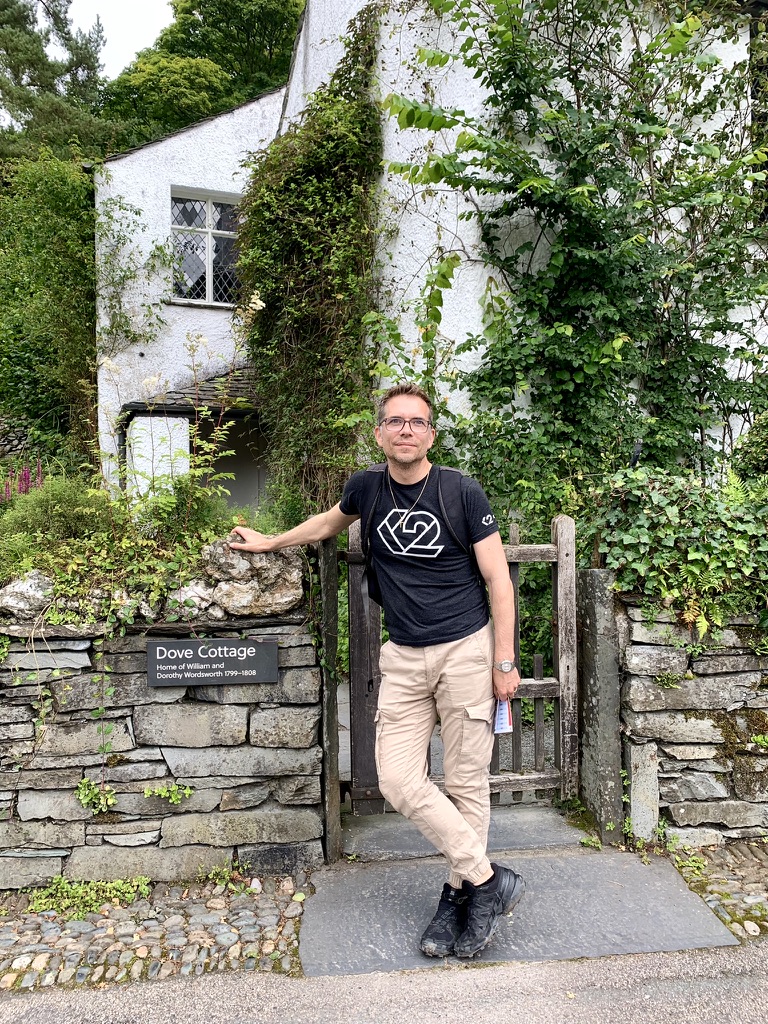
But what really fascinated me was his enthusiasm, and ultimate dismay, at the French Revolution (1787-1799). For Wordsworth, the Revolution held such promise. I wonder if that was especially because of the affinity between his own poetic thought about the pure truth that nature can bring to people and the Revolution’s initial emphasis on the natural, sacred and inalienable rights of man contained in its guiding Declaration. Unfortunately, whatever beautiful ideals the Revolution espoused at the beginning quickly diminished during the Reign of Terror. Ultimately, a power vacuum formed that contributed to the rise of Napoleon. As Wordsworth watched events unfold in France, he moved from an ardent republican to a Conservative, skeptical of how much political systems and governance should change, and if so, the speed at which they should do it. The French Revolution’s orgy of bloodshed as it sought to quickly usher in a new era of fraternity and equality only to become a new oppressive tyranny made Wordsworth fearful and cautious. As The Who once sang in Won’t Get Fooled Again: “Meet the new boss / Same as the old boss.”
* * *
It’s amazing how quickly I can find myself on a peaceful walk just kilometres from Keswick, even at peak tourist season. On a quiet trail, I pass only a few other hikers on my journey. How easy it is to transport myself back to another century with the rugged green fells rising on either side of me. A light fog drapes about the valley of Borrowdale that I am descending into: in the distance I can see sheep on a farm and hear the curt orderly calls of a sheepdog.
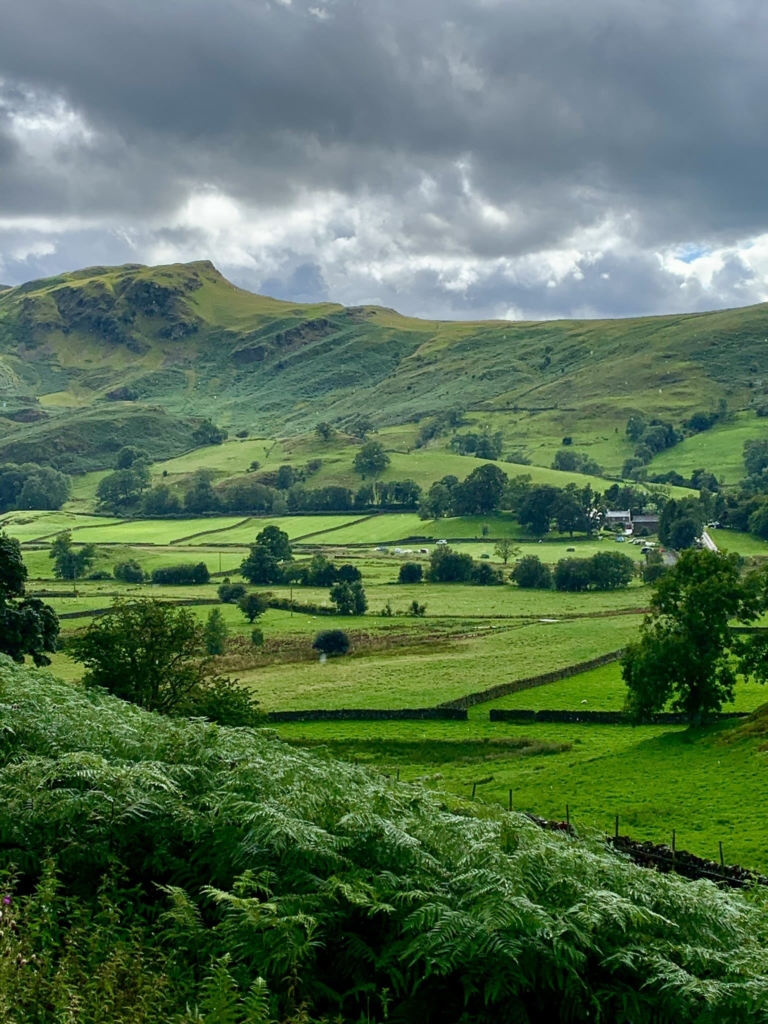
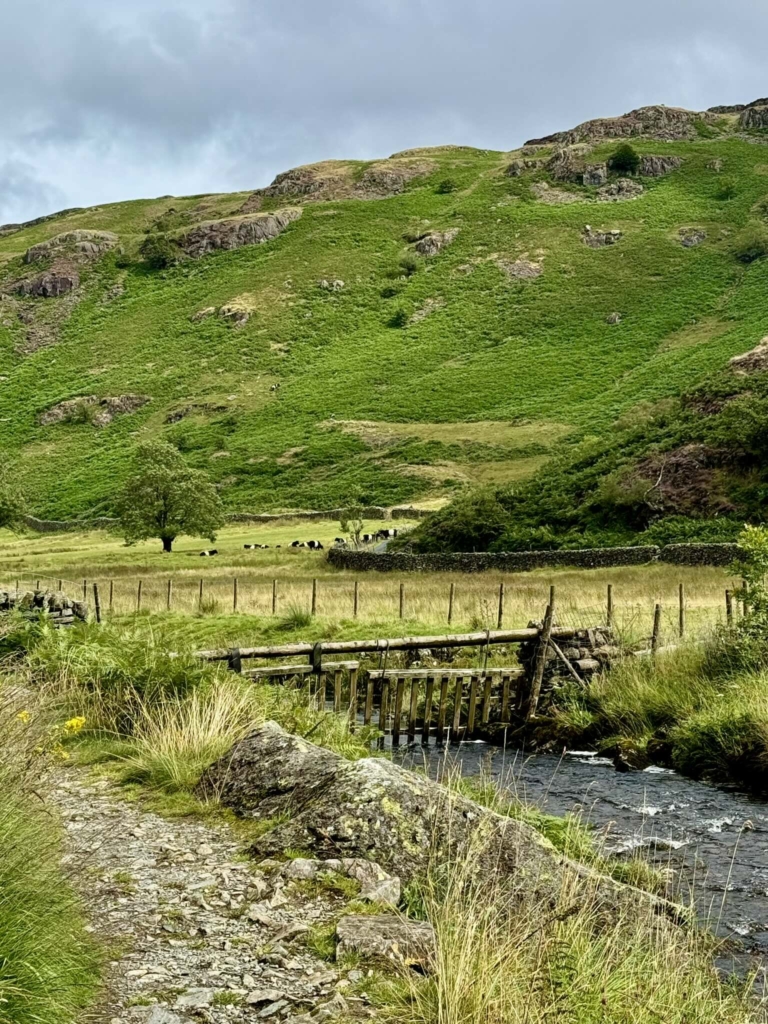
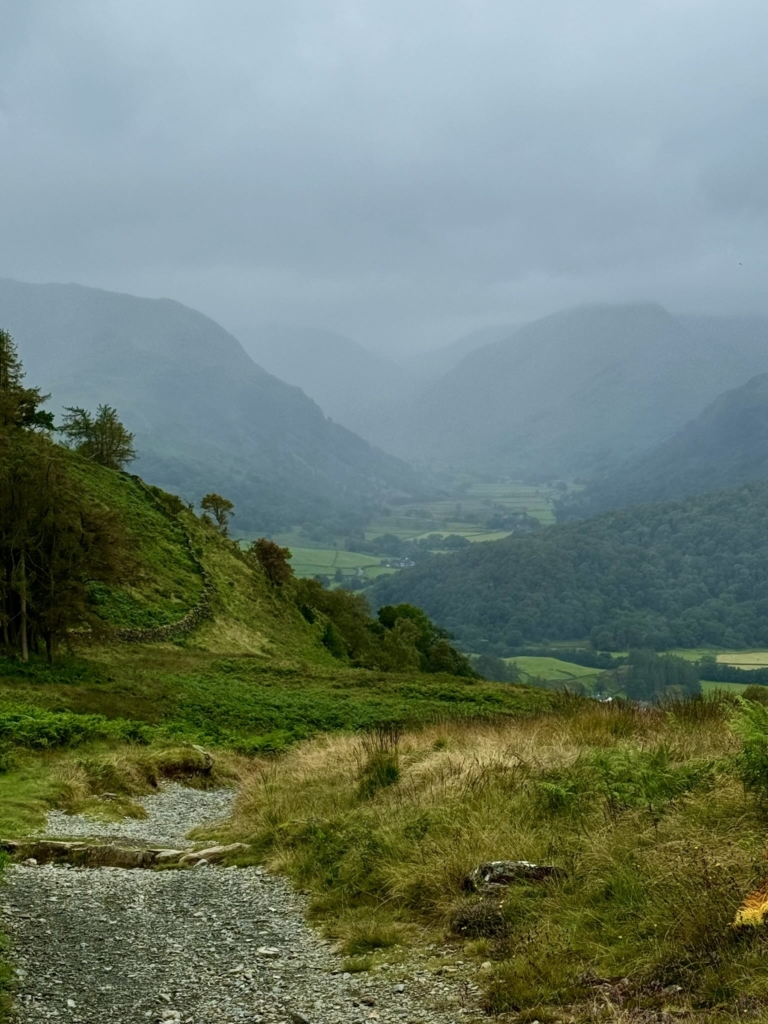
I find myself connecting with Wordsworth on another level outside of his poetry and love of nature. Amidst my own anxieties and worries for the world, I fear rapidly implemented solutions that have great promise but are ill-thought out. There are too many lessons in history that would advise against this. In fact, as is frequently the case, the solution becomes a new or even worse problem.
I am turning over a nursery rhyme in my mind: “I know an old lady who swallowed a fly.” A silly exercise, I know; yet, I am amused by it. Each solution the old lady takes to solve one problem spawns another problem, bringing her closer to her demise: the spider to catch the fly, the bird to catch the spider…and eventually a horse that kills her. Is there sense in this nonsense? Perhaps I’ll explore this further another time in some other blog entry. But for now, I feel there is a bit of a lesson about human progress. Every advancement we seem to make presents a new problem and we can never go back to a previous state. When the old lady swallowed the dog to catch the cat she ate earlier, she might have thought she should have just stopped at swallowing the spider to catch the fly. But alas…
* * *
However betrayed Wordsworth felt by the outcomes of the French Revolution, he continued to find joy and tranquility here in the Lakes. The relationship he had with these fields, forests and fells was deep and real. It was home. It gave him epiphanies and revelations, but also great comfort and security. He managed to feel that illusive contentment that seems so untenable for many of us today who are in constant forward motion.
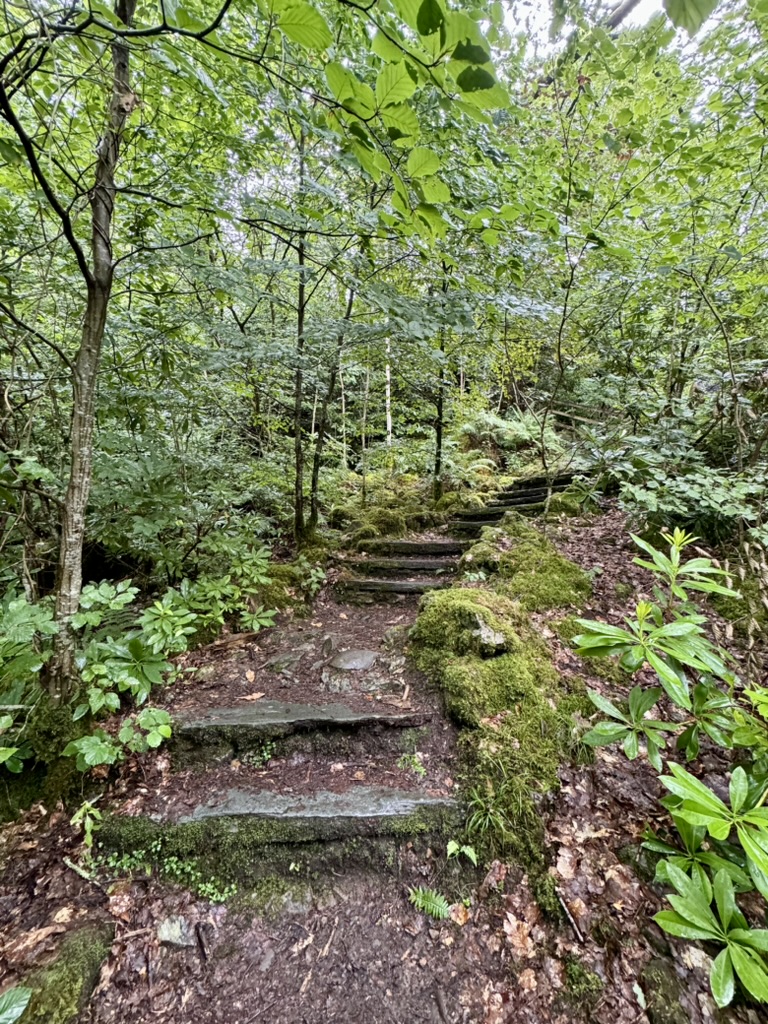
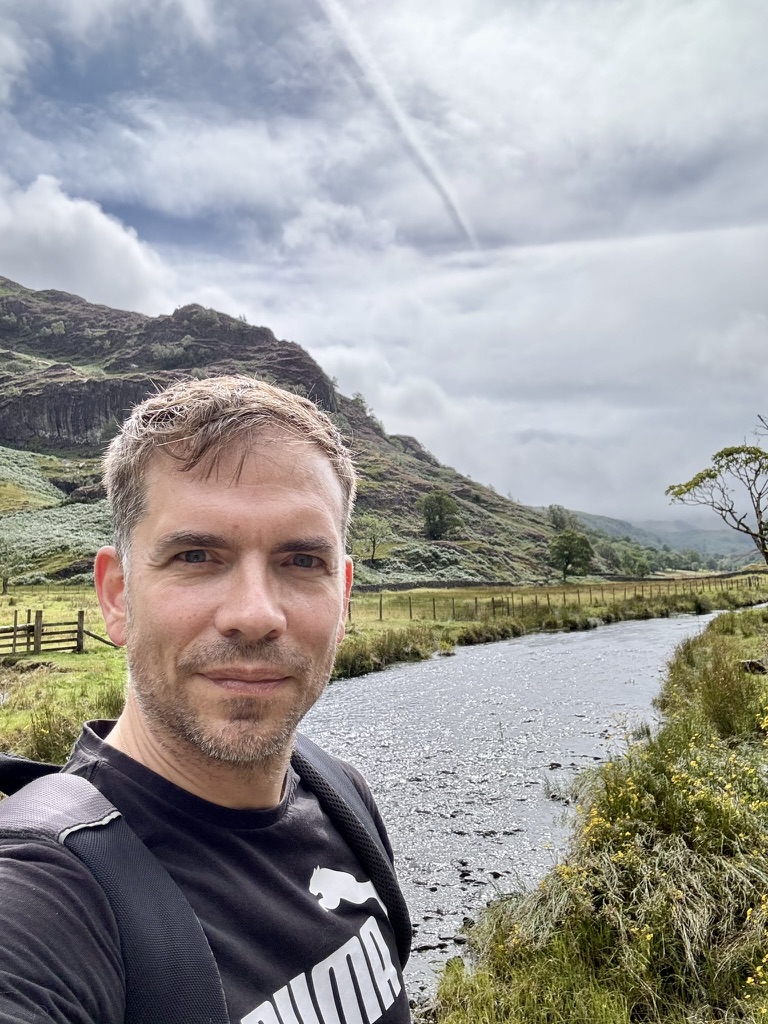
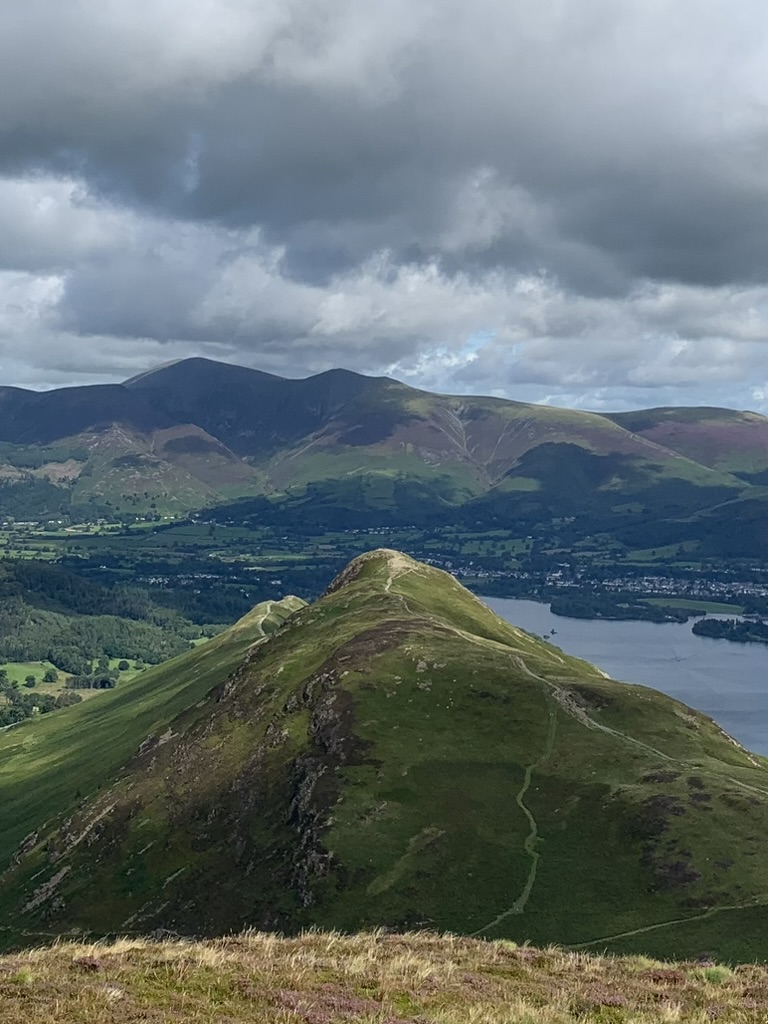
This is the greatest gift of Lake District: these mountains and valleys insulate a person and let one’s mind roam playfully as the body wanders. Now, as I come into the small town of Rosthwaite where a friendly hiker suggested I grab lunch at a modest cafe, I cannot say I feel carefree, but rather, cared for. There is a healing power here that facilitates contentment.
I find myself – daydreaming. How wonderful it would have been to live here in the 18th century, to wander these trails in the day, and read books and reflect on their meanings at night. I could let nature be my interpretive lens and have friends like Coleridge over to philosophize with me. Oh, that assumes that I am of a class that doesn’t need to work the land everyday to find the means to get food; it assumes I didn’t die young (in 1800, 1 in 3 children didn’t get to their 5th birthday); it assumes I was educated and taught to read and write; it assumes I was relatively healthy and avoided or conquered all the hundreds of things that could kill me; it assumes… so much. Did I mention I also want a shower and a toilet? Watch what you wish for, as the saying goes. I’m already caveating my ideal state bringing in modern trappings of progress to an age that did not have them. Alas, I’ve swallowed the spider. I cannot go back. And even if I could, I’m not sure I’d like the true implications of it unless I was able to state my terms of entry.
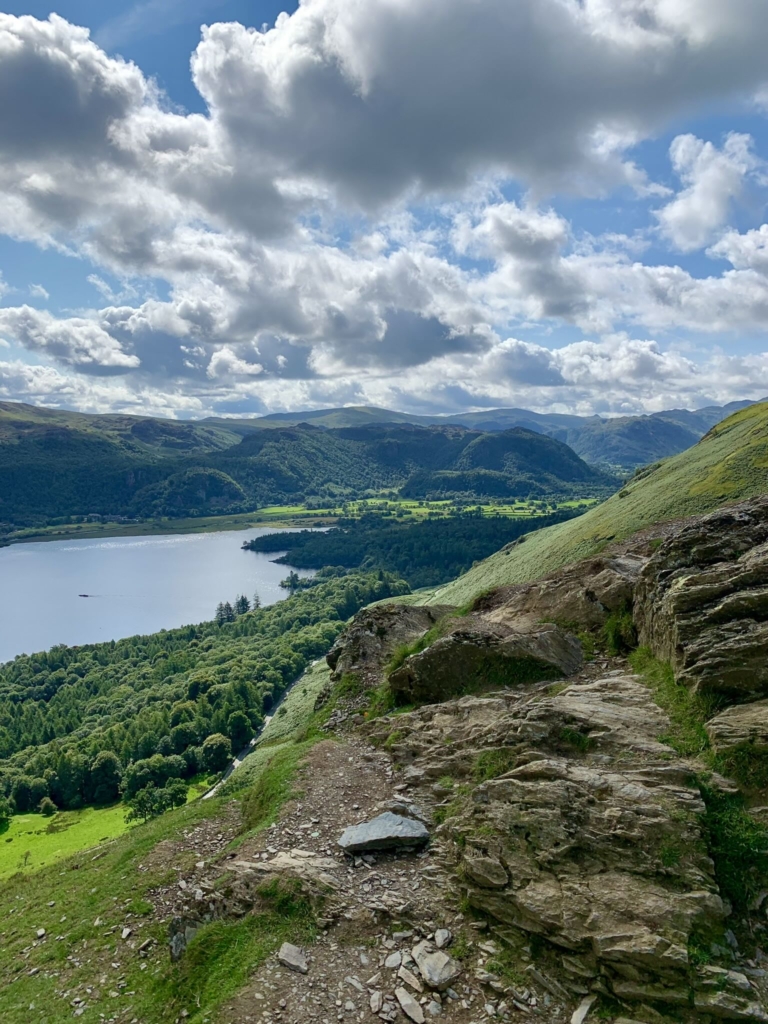
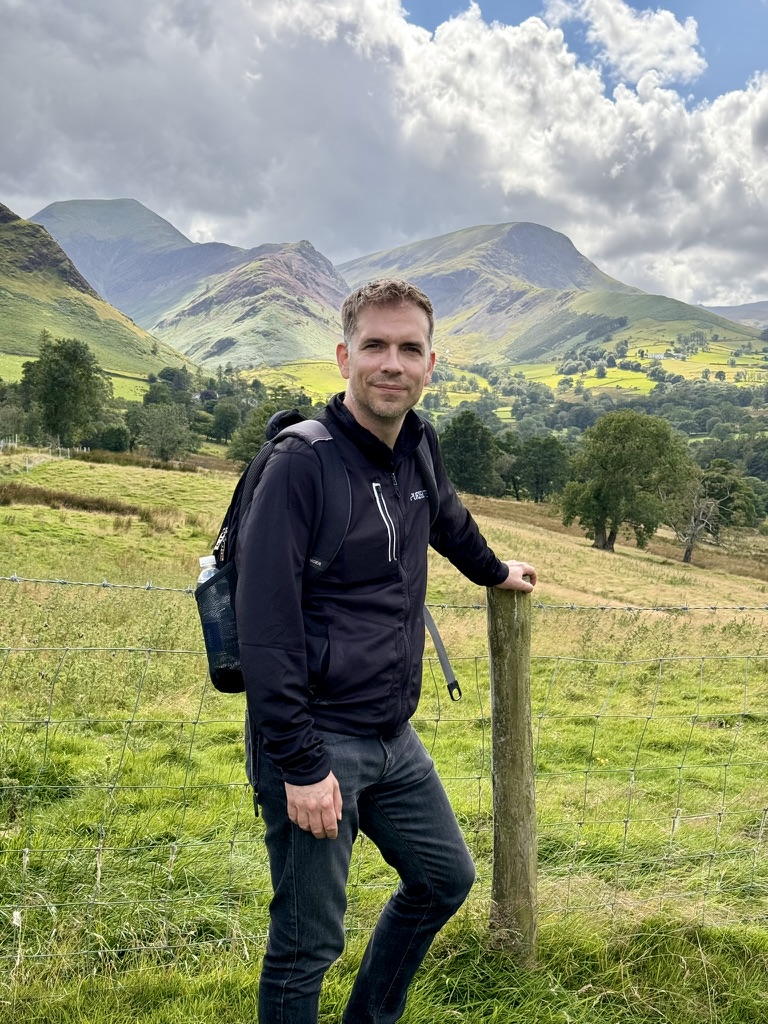
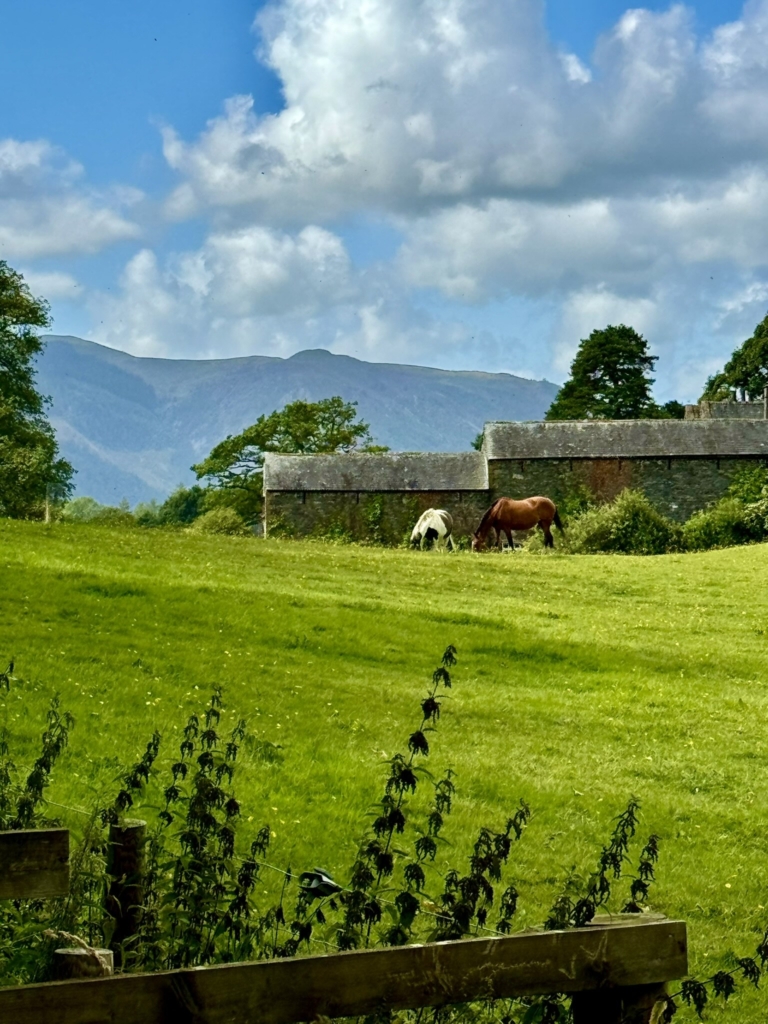
So, I arrive at where I think I need to be – grateful for this wonderful sojourn knowing I am blessed to see this beautiful area a second time and, God willing, a third. But what I’m really learning is to find peace and contentment with where I am. That’s remarkably hard, but I’m learning. And perhaps it’s a copout, and there is some cowardice in me, but I find I’m trying to focus less on all these big problems in the world and to stop being angry because nobody seems to be implementing my solutions. I’m focussed on possessing a bit more gratitude in my personal life and figuring out how to be content, at peace, and inspired by the opportunities and things I have. And these trips to the Lake District are just one of many things I should be thankful for.
I guess Wordsworth is teaching me a third thing: wherever you live, find your little zone of peace, security, and creativity and nurture it. That little garden can dampen the noise and chaos of the world and help you hone in on the important things – friends, family, and books.

